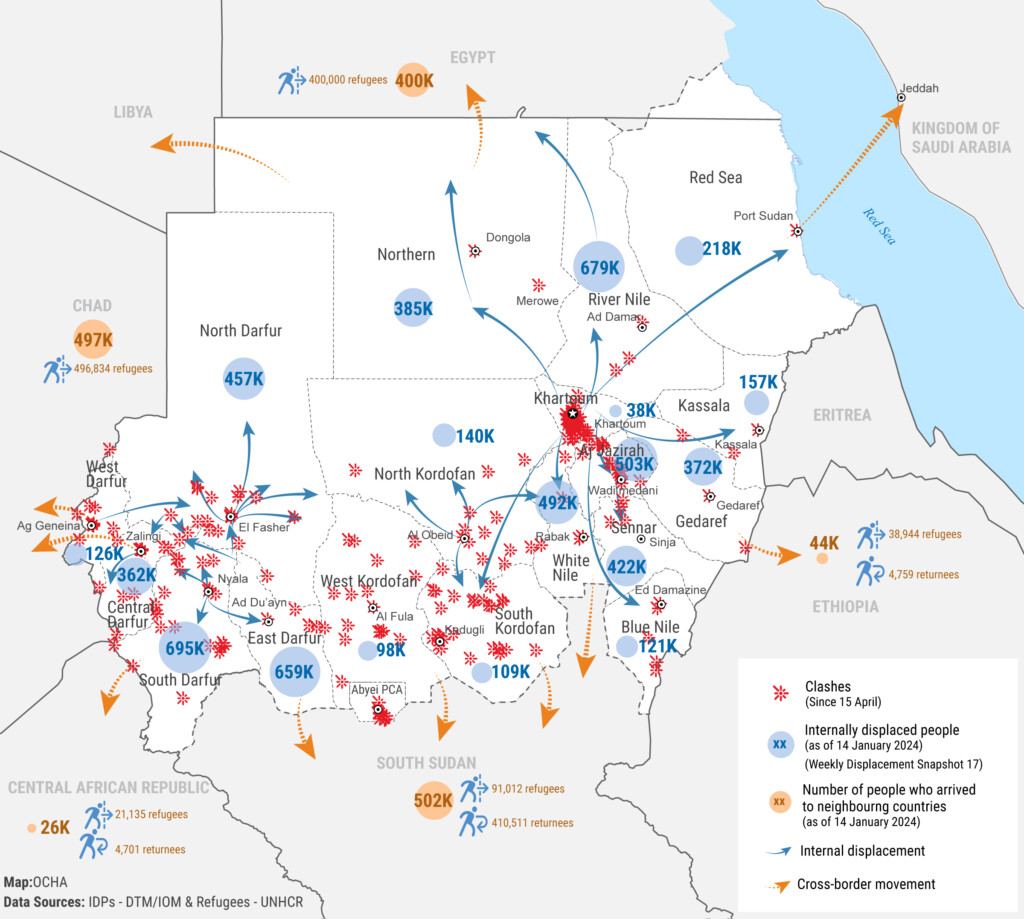OCHA: 19,600 people newly displaced this week in Sudan

Map of displacement and conflict across Sudan from April 15 to January 21 (Map: OCHA)
The UN Office for the Coordination of Humanitarian Affairs (OCHA) has announced that 19,600 people have been displaced in Sudan over the past week, making the total number of displaced and refugees 7.6 million since the war broke out on April 15. Port Sudan in Red Sea state has seen a large increase in displaced shelters as an increasing number of people arrive from other parts of Sudan.
In a report published on Sunday, OCHA quoted that 13,100 people have been killed according to the Armed Conflict Location and Event Data Project (ACLED) as of January 15, and at least 26,051 injured according to the Sudanese Ministry of Health as of December 8.
The World Health Organisation (WHO) Surveillance System for Attacks on Health Care indicates that 60 attacks on health care have been reported since the onset of the violence last year.
According to the International Organisation for Migration (IOM) Displacement Tracking Matrix, displaced people have been accommodated in 6,355 locations in all 18 states of Sudan, an increase of 73 locations in one week.

Children account for about half of the displaced. According to OCHA, Sudan has the largest number of displaced people and the largest child displacement crisis in the world.
South Darfur received the largest number of displaced people (12 per cent), followed by the River Nile state (11 per cent), East Darfur (11 per cent), White Nile state (eight per cent), El Gezira (eight per cent), and North Darfur (eight per cent).
The IOM Displacement Tracking Matrix field teams reported that about 3.6 million of displaced people (59 per cent) are from Khartoum state, followed by South Darfur (15 per cent), North Darfur (eight per cent), El Gezira (eight per cent), Central Darfur (four per cent), West Darfur (three per cent), and the rest from six other states. In addition, some 1.6 million people have crossed to neighbouring countries.
Port Sudan
People continue to arrive in Port Sudan seeking shelter, volunteers reported to Radio Dabanga on Sunday. They mainly come from Wad Madani, capital of El Gezira.
Volunteers reported that the number of shelters established in the Red Sea state capital since December has risen to 28, an increase of more than 20 centres after the Rapid Support Forces (RSF) took control of Wad Madani.
One volunteer, Juma Idris, told Radio Dabanga that several grassroots initiatives are active in providing food, blankets and clothing to displaced people in shelters. The displaced are in dire need of mattresses and blankets, he said, noting that they are relying on the assistance provided by local residents.
Port Sudan has become the de facto capital of Sudan since the RSF took control of Khartoum in August. Ministries, embassies, UN agencies, and organisations are working from temporary offices in what has become an ‘alternative capital’.
Humanitarian assistance
OCHA confirmed that more than 9,700 suspected cases of cholera, including 269 associated deaths, had been reported as of January 16.
“Devastating conflict and organised violence, coupled with the continued economic decline, have driven about 17.7 million people across Sudan (37 per cent of the population) into high levels of acute food insecurity,” said OCHA.
Half of Sudan’s population is currently in need of humanitarian assistance, said OCHA, which also listed obstacles to providing aid in Sudan. “Insecurity, looting, bureaucratic impediments, poor network and phone connectivity, lack of cash, and limited technical and humanitarian staff on the ground have been affecting the delivery of humanitarian assistance in many parts of the country. Fuel shortages also affect the movement of humanitarian staff and supplies and the generation of power needed for operations (maintaining cold chain storage, supplying water, etc).”
From December to January, the harvest season in Sudan, food insecurity outcomes were expected to be “atypically elevated and rising” according to the Famine Early Warning Systems Network (FEWS NET), as the “lean season is expected to start atypically early in most areas.” Sudan topped this year’s International Rescue Committee (IRC) watchlist of countries most likely to experience a deteriorating humanitarian crisis.











 and then
and then